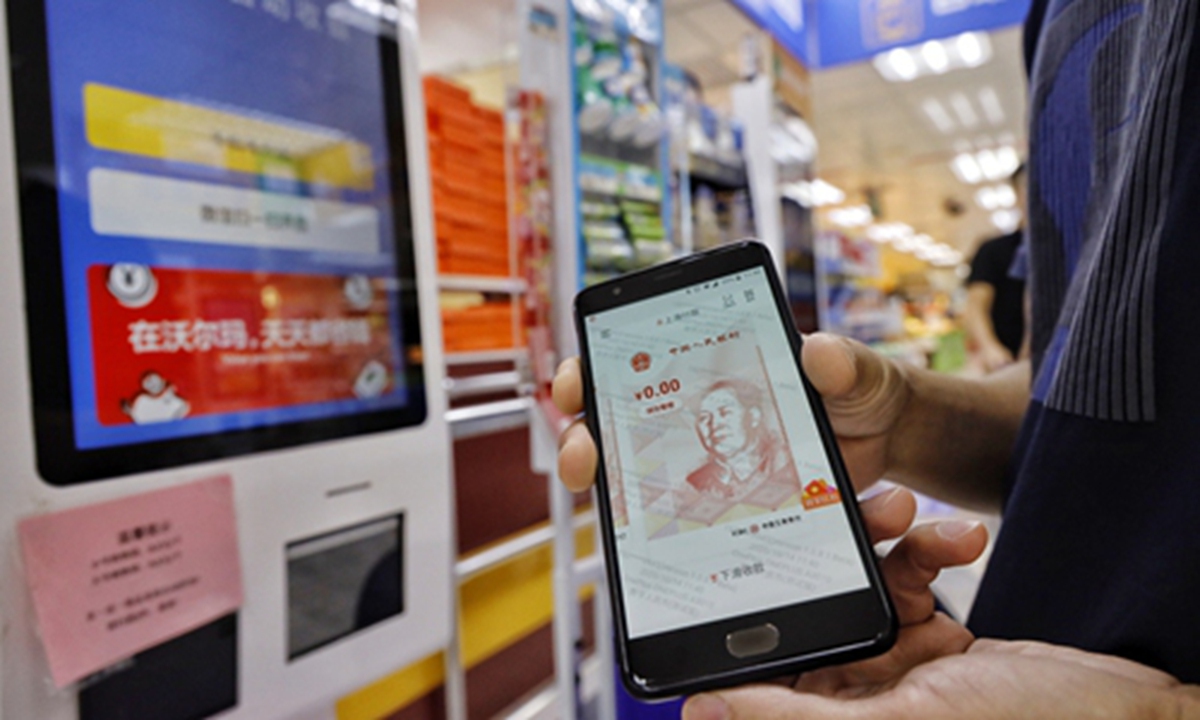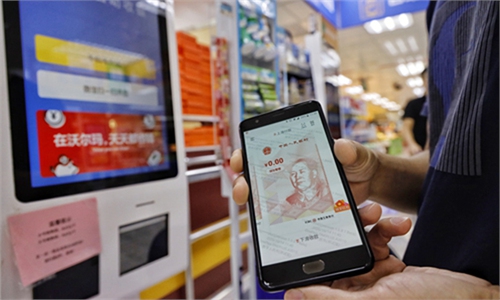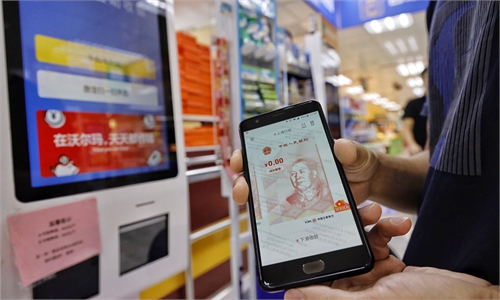
Residents who received "red packets" of digital yuan use the money in stores in Shenzhen, Guangdong Province. Photo: Li Hao/GT
China's digital yuan transactions reached 62 billion yuan ($9.7 billion) by October 22, falling short of expectations, given limited trading scenarios, experts said.
In the relevant sub-forum of "Hong Kong Fintech Week 2021", Mu Changchun, director of the Digital Currency Research Institute of the People's Bank of China, outlined that as of October 22, 140 million digital yuan personal wallets and 10 million corporate wallets have been opened.
"The total number of transactions reached 150 million, and the transaction volume was close to 62 billion yuan," Mu said.
While the result has been positive, experts said that there is more to be done to expand the digital currency's use.
"The 62-billion-yuan transaction volume is by no means big, especially given the context of over 100 billion in transaction volume during the Double 11 online shopping festival," Dong Dengxin, director of the Finance and Securities Institute of Wuhan University, told the Global Times on Sunday.
The reason for the relatively low transaction volume has to do with the fact that there are few occasions for transactions, and since digital currency mainly replaces cash, the cumulative transaction scale is not that large, Dong said, noting that market players such as Alipay and Wechat Pay have already realized cashless transaction.
Another reason for the low transaction volume of digital yuan is that the actual circumstances for using yuan remain limited, the expert said, but it will definitely expand in the future.
Since late 2019, the People's Bank of China has launched pilot experiments for using the digital yuan at dozens of places including cities like Shenzhen and Suzhou and Xiongan New Area.
The digital yuan will also be used during the Beijing Winter Olympic Games.
Currently, 1.55 million merchants support digital yuan wallets, covering areas of public utilities, catering services and transportation.

Residents who received "red packets" of digital yuan use the money in stores in Shenzhen, Guangdong Province. Photo: Li Hao/GT
China's digital yuan transactions reached 62 billion yuan ($9.7 billion) by October 22, falling short of expectations, given limited trading scenarios, experts said.
In the relevant sub-forum of "Hong Kong Fintech Week 2021", Mu Changchun, director of the Digital Currency Research Institute of the People's Bank of China, outlined that as of October 22, 140 million digital yuan personal wallets and 10 million corporate wallets have been opened.
"The total number of transactions reached 150 million, and the transaction volume was close to 62 billion yuan," Mu said.
While the result has been positive, experts said that there is more to be done to expand the digital currency's use.
"The 62-billion-yuan transaction volume is by no means big, especially given the context of over 100 billion in transaction volume during the Double 11 online shopping festival," Dong Dengxin, director of the Finance and Securities Institute of Wuhan University, told the Global Times on Sunday.
The reason for the relatively low transaction volume has to do with the fact that there are few occasions for transactions, and since digital currency mainly replaces cash, the cumulative transaction scale is not that large, Dong said, noting that market players such as Alipay and Wechat Pay have already realized cashless transaction.
Another reason for the low transaction volume of digital yuan is that the actual circumstances for using yuan remain limited, the expert said, but it will definitely expand in the future.
Since late 2019, the People's Bank of China has launched pilot experiments for using the digital yuan at dozens of places including cities like Shenzhen and Suzhou and Xiongan New Area.
The digital yuan will also be used during the Beijing Winter Olympic Games.
Currently, 1.55 million merchants support digital yuan wallets, covering areas of public utilities, catering services and transportation.


